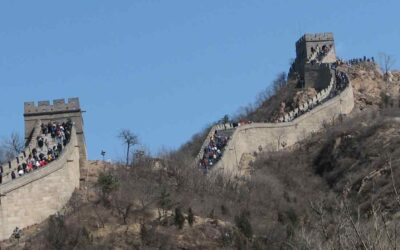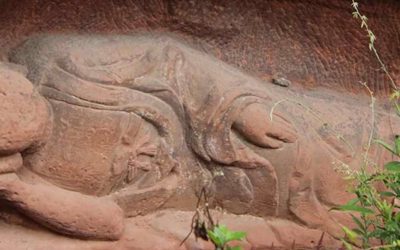Zhuang phallic ritual
Zhuang minority has an interesting phallic ceremony. According to their legends, in antique times there was no communication between the two banks of the Hongshui River, women living on one bank of the river and men on the other. The god Buluotou stretched out his big and long sex over the river, making a celestial bridge. Thanks to this bridge the people crossed the river, and they mated making the first families, and humanity propagated.
When the god become old and the bridge turned soft, he removed the bridge leaving two pubic hairs that turned in two ways, masculine and feminine, making a bridge of men and women, where the people met in joy.
Every year, in the days following the New Year Festival, local people gather in the two banks of Hongshui River to celebrate a festival honoring Buluotou’s sex. They sacrifice an ox and a cow to Buluotou, provided by the people living on the two banks of the river. Images of the sex of the god are hung everywhere, usually as a paper sail, that the wind can blow as in the penis of the god have an erection.
Zhuang people eat and drink, the young people sing love songs. During the festival, they honor also their goddess Miliujia, as they consider that both she and Buluotou together created human beings. In the last 30 years, the sacrifice of the ox and cow were stopped, but not the festival atmosphere and the singing gathering.
Last posts
The truth about the Great Wall
The truth about the Great Wall What would later come to be known as the Great Wall formed as a response to increased Mongol raiding after Esen was killed in 1455. Having failed to capitalize on the capture of Zhengtong, Esen lost the political momentum that had held...
Buddhist Immersion from Shanghai: No Need to Board a Plane—Paradise Is Right at Your Doorstep
Buddhist Immersion from Shanghai: No Need to Board a Plane—Paradise Is Right at Your Doorstep Residents of Shanghai eager to learn more about Buddhist art and history often think they must undertake long journeys to reach the sacred mountains of this religion. What...
The Lost Mythology of Ancient China
The Lost Mythology of Ancient China Reconstructing the mythology of ancient China is a painstaking task that tries to characterize some legendary figures and situations based only on the few sentences about them found in later works by philosophers and historians. The...







